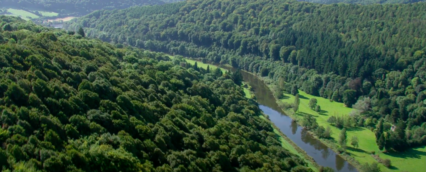Jac Lewis considers the role of Welsh working-class history in the advancement of British capitalist modernity and reflects on the importance of nostalgia, or ‘hiraeth’, in shared Welsh identity as we enter a techno-scientific age.
To paraphrase philosopher Barbara Cassin’s question on the strange feeling of nostalgia: when are we ever at home in Wales? This question is not only increasingly pertinent due to a renewed popular demand for Welsh national independence from the United Kingdom – Welsh support or openness to independence is at the highest it has ever been, with 33% in a recent YouGov poll stating they would support a referendum on the issue – but in the way it challenges us to re-imagine and re-invent the perennially haunted contours of Welsh being, thought and language. The homesick longing for Wales, or ‘Hiraeth’, is roughly similar to the Portuguese ‘Saudade’ or the Swiss ‘Heimweh’ in that all have a focus on space, the modern romantic connection with one’s landscape, rooting the chaos of time into the spiritual setting of the homeland. It is also often tinged with the knowledge that what is being longed for has been irretrievably lost or has never actually existed – a return to a here which is always-already incomplete. This feeling is embedded in modern Welsh culture, from the landscape painting of Kyffin Williams to the famous anti-war poetry of WWI soldier Ellis Evans (aka Hedd Wyn). Even the fervent Marxism of Welsh historian Raymond Williams is not free of moments of intense nostalgic yearning towards the country of his birth in his The Country and The City.
But increasingly Welsh nostalgia has begun to change as a result of the effects of neoliberal capitalism and austerity on Wales in the last forty years. What activist Franco ‘Bifo’ Berardi described as the “slow cancellation of the future” still applies to the post-industrial condition of Welsh culture and life in the 21st century, where the lost futures of radical Welsh socialist activism – from the Newport and Merthyr Risings in the 19th century to the development of the modern labour movement – are effaced by the domination of capital. Welsh longing is starting to shift from the fixed locality of space to a different rhythm or trajectory of time – one that is haunted by its frozen and foreclosed tradition of political possibilities. In a melancholic tone, Gareth Leaman in a review of the Netflix show Sex Education (most of which was filmed in south Wales) refers to his country’s (inter)national depiction “… as a hyper-real netherworld in which decaying infrastructure can only be used as props to tell other people’s stories.”

While a momentum for total Welsh self-governance is growing, motivated in particular by Wales’ social democratic nationalist party Plaid Cymru which has pinned the uncertainty and anger caused by Brexit and austerity towards ‘Westminster’ – the seat of UK government in London – it is unclear how far an explicitly anti-capitalist politics, which historically comprised so much of this Welsh identity, will go. The 21st century Welsh working class have a somewhat unique position in that they make up a labour aristocracy of the wider developed and extractive global north, while also contending with a fraught history of being its neighbour’s colonial subject. From the Laws in Wales Acts 1535 and 1542 to the rapacious 19th century industrialisation of the country to meet the demands of British imperialism (with up to half of the iron exported by Britain in the 1830s being produced in south-east Wales), the advance of capitalist modernity in Britain has meant the ruthless exploitation and subordination of England’s client state.
Motivation for independence also includes certain atrocities which have devastated landscape and community alike – these include the deliberate flooding of Tryweryn Valley in 1965 by Liverpool City Council against the consent of the local Welsh authorities and residents, losing centuries-old communities and giving rise to the slogan ‘Cofiwch Dryweryn’ (Remember Tryweryn). Another was the dumping of toxic waste under Brofiscin Quarry in the same year by Monsanto Corporation, with its long-lasting disastrous effects of the spread of pollutant PCBs (polychlorinated biphenyls) now threatening the water supply of cities such as Cardiff and Birmingham. The quarry has been described as “one of the most contaminated places in Britain”. A homeland drowned and polluted, the psychological adjustment to hegemonic neoliberalism in culture and economy, the social divisions over Brexit and even in the demographics of North and South; all continue to force Wales into a political (un)dead-end.
The rise of a politics of Welsh nationalism vis-à-vis English control raises an urgent question for Welsh consciousness-raising: how do you figure an emancipatory movement from within an emotional atmosphere processed all the way down by ‘English’ modernity? Is a Welsh homecoming desired and even still possible in a time when neoliberalism and techno-science have eviscerated solidarities of national and class community? At the heart of this impasse – of Wales’ uneasy and paradoxical place in global modernity – is the nostalgic question of home.
As the artist Svetlana Boym has pointed out, nostalgic feeling is a modern invention. The term was created by the Swiss doctor Johannes Hofer in 1688 in his medical dissertation on the topic, where it was observed to be an illness of the body (originating from the ‘oval tubes of the centre brain’) and to be treated urgently, as he recommends: “… the patient should be taken away [to their home country] however weak and feeble, without delay, whether by a travelling carriage with four wheels, or by sedan chair, or by any other means.” This urgency was primarily a military concern for the next two centuries, since this strange and uncontrollable ‘disease’ of longing would severely affect the performance of soldiers away from home and across cultures and nationalities. From the Swiss soldiers who longed for the cowbells and native songs of the heimat to the Russian generals confronting Napoleon in the early 1800s who found a solution in the threat of burying wayward daydreamers alive under foreign soil.
As in the case of hiraeth, many clinical cases in the Early Modern period had to do with an overwhelming yearning for a homeland in a period of burgeoning national feeling and the faltering of Feudal loyalties; the term itself made one of its first appearances in a collection of poems called the Old Verses (Hen Penillion) which were documented in the 16th century. In one story, a poet is overcome with a “cruel hiraeth” which fills him with restless and maddening yearning for the fleeting sensation of homeland – exactly the pathological symptoms of nostalgia observed by military doctors across Europe a century later.
But nostalgia would mutate from a ‘curable’ disease into an inescapable feature of what it is to be human – today, it is an everyday affliction of our imagination. The ache of modern life is in our relentless drive for self-invention, the insatiable question of authentic being and happiness, and the subjugation of the past to renew human experience. From this standpoint, past and future are interwoven into the progressive and evolutionary conception of history – a dynamic project of individual and social existence, intimately related to the invention of nostalgia, as Boym emphasises: “The nostalgia that interests me here is not merely an individual sickness but a symptom of our age, a historical emotion. It is not necessarily opposed to modernity and individual responsibility. Rather it is coeval with modernity itself. Nostalgia and progress are like Jekyll and Hyde: alter egos.”
So what does this rapid advance of techno-science mean for Welsh nostalgia? With its manifold definitions online, the term hiraeth has dispersed from its original Welsh context of longing for ‘Cymru Fach’ into an esoteric cultural reference, a shorthand to express the homesickness, spatial or temporal, of anyone and everyone. This is especially clear in the political mutations of hiraeth, where it has been used as varyingly as motivating people at work with a more ‘positive’ nostalgic attitude, as a rallying cry for labour movements, and even as the name of a US-based white nationalist music outfit. Uprooted from the alienated Welsh identity – “For Wales: See England” as the entry for Wales reads in the 1888 Encyclopaedia Britannica – hiraeth merely evokes another worldless phantom in a rambling digital matrix of anxieties and ideologies. As global technological progress entangled with capitalist imperatives reshape the nostalgic experience, the Welsh language’s status as both medium and message for the longing for Welsh homecoming – let alone its ability to articulate a common need for freedom and exit – is severely waning.
However, there are certain groups emerging in Wales which not only recognise the synthetic origins of Welshness but also the synthetic possibilities for new forms of Welsh identity and desire. Taking inspiration from Welsh sci-fi literature, the Welsh digital culture blogger Rhodri ap Dyfrig coins the term Cambrofuturism (Cymruddyfodoliaeth) to stand for a regeneration of Welsh culture. In Dyfrig’s view cambrofuturism sees no necessary distinction between nostalgic preservation and technological acceleration, as he explains:
“Grabbing onto something that’s alien to your culture in order to create a unique mutation of that culture. Perhaps for cambrofuturism, that breaking away from claustrophobic, one-size-fits-all, traditional-focused Welshness is part of the drive to create new worlds, and the reason why technology plays a vital role in the synthesis. All tools possible must be utilised in the aim of mining a new seam of culture, occupying the future and making new traditions of old.”
It is this Welsh futurist ambition that drove Dyfrig to co-found Hacio’r Iaeth (‘Hacking the Language’), a yearly ‘unconference’ that draws together projects and strategies for integrating the Welsh language with cybernetics. It uses digital media to promote the Welsh language, but also estranges and melds the Welsh language with technology in a way that can expose what was always alien about the nostalgia in the make-up of Welsh identity. As Barbara Cassin explains: “Denaturalizing the mother tongue—that, at the end of the day, is always what saves it.” This certainly does not mean abandoning nostalgia but discovering and taking advantage of the new ways nostalgia is emotively charged and produced in today’s world. Amidst the backdrop of social and psychological upheaval that capitalism has generated in our little country, Wales is a home that we can create as we explore the possibilities emerging from its haunted ruins.
Jac Lewis is a first year PhD student at Cardiff University studying the history of nostalgia and its relationship with ideology.
hiraeth hiraeth hiraeth












